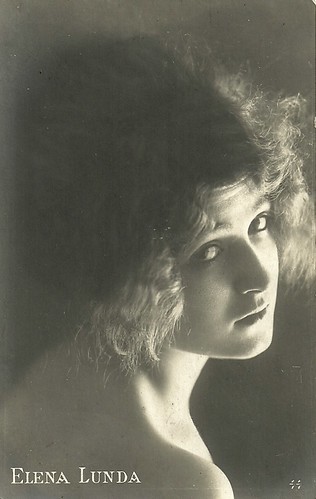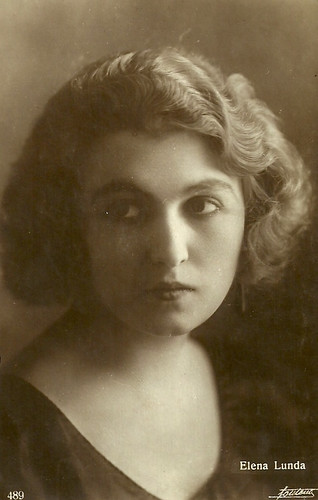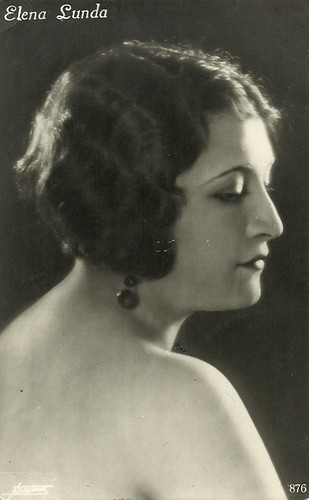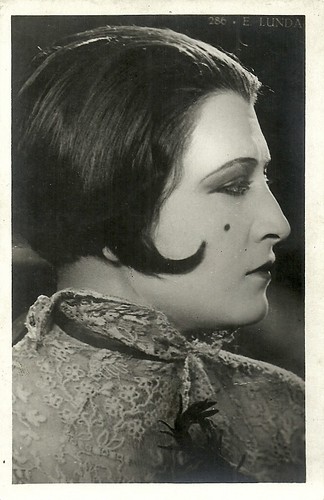Elena Lunda (1901-1947) was an Italian actress who acted in some 35 silent Italian and German films. She was briefly married to actor Alfredo Bertone.

Italian/Romanian postcard by Fotocelere / Edition SARPIC, Bucarest.

Italian postcard, no. 916. Photo: S.A. Stefano Pittaluga. Elena Lunda in Il gigante delle Dolomiti/The Giant of the Dolomites (Guido Brignone, 1927), starring Bartolomeo Pagano as Maciste.

Italian postcard, no. 442. Photo: S.A. Stefano Pittaluga. Elena Lunda, Franz Sala (the corpse on the ground), and Amilcare Taglienti in Gli ultimi zar/The last Czar (Baldassarre Negroni, 1928).
Elena Lunda was born in 1901 in Palermo, Sicily. She debuted at a young age at the film company Do.Re.Mi. by Lucio D'Ambra in 1919. Her first film there was Passa il drama il Lilliput/Skip the drama in Lilliput (Lucio D'Ambra, 1919), with Romano Calo.
Soon she shifted to the Cines company for various films. She acted in all kinds of modest film productions in the early 1920s, in which she often had the lead. She was the antagonist of Francesca Bertini in La sfinge/The Sphinx (Roberto Roberti, 1920), Anima selvaggia/Wild Soul (dir. unknown, 1920), Fatale bellezza/Fatal Beauty (Gaston Ravel, 1922), and Oltre la legge/Beyond the law (Gaston Ravel, 1923).
She also appeared opposite Pina Menichelli in La seconda moglie/The Second Wife (Amleto Palermi, 1922) and Occupati d’Amelia/Take Care of Amelia (Telemaco Ruggeri, 1925), and opposite Carmen Boni in Il riscatto/The Redemption (Guglielmo Zorzi, 1924).
When the crisis in the Italian film industry started, she moved to Germany. There she played from 1923 in films with often Italian leads, such as Bohème - Künstlerliebe/La Boheme (Gennaro Righelli, 1923), starring Maria Jacobini as Mimi and Lunda as Musette.
With Angelo Ferrari she acted in Der Racher von Davos/The Avenger of Davos (1924), and with Luciano Albertini in the circus drama Der Mann auf dem Kometen/The Man on the Comet (Alfred Halm, 1925).

Italian postcard by Ed. A. Traldi, Milano, no. 488. Photo: Fontana, Rome.

Italian postcard by Ed. A. Traldi, Milano, no. 489. Photo: Fontana, Rome.

Italian postcard by Ed. A. Traldi, Milano, no. 876.
Elena Lunda also appeared in the German films Frauen, die nicht lieben dürfen/Women who may not love (Geza von Bolvary, 1925) with Olaf Fjord, Frauen, die man of nicht grüsst/Women You Rarely Greet (Frederic Zelnik, 1925) with Lya Mara, Der Liebeskäfig/The Love Trap (Erich Schönflder, Richard Eichberg, 1925) with Johannes Riemann, Die Assmanns/The Assmanns (Arthur Bergen, 1925) with Grete Reinwald, and Der Ritt in die Sonne/The ride in the sun (Georg Jacoby, 1927) with Livio Pavanelli.
After these German films, Lunda returned to Italy to act in films by producer Stefano Pittaluga. First she appeared in Il gigante delle Dolomiti/The Giant of the Dolomites (Guido Brignone, 1927), starring Bartolomeo Pagano as Maciste, this time a mountain guide in the Alps.
After the short I martiri d’Italia/The martyrs of Italy (1927), Lunda acted in Gli ultimi zar/The Last Tsars (Baldassarre Negroni, 1928), with again Pagano as Maciste. Her last performance was in La compagnia dei matti/Company and the Crazy (Mario Almirante, 1928), in which a young Vittorio De Sica had a part.
Lunda retired after the death of her husband, actor Alfredo Bertone. The couple had done quite a few films together, including La casa in rovina/The ruined house (Amleto Palermi, 1920), Don Carlos (Giulio Antamoro, 1921), and La seconda moglie/The Second Wife (Amleto Palermi, 1922).
Elena Lunda died in 1947 in Rome, only 46. She and Alfredo Bertone had two daughters.

Italian postcard, no. 286.

Italian postcard by G.B. Falci, Milano, no. 424. Photo: S.A. Stabilimenti Pittaluga. Elena Lunda in La compagnia dei matti/Company and the Crazy (Mario Almirante, 1928). Apparently, this card was made for export, using a French title, Rien que des foux (Nothing but Fools). Remade in 1941 as Se non son matti non li vogliamo.
Sources: Wikipedia (English and Italian) and IMDb.
This post was last updated on 10 April 2025.

Italian/Romanian postcard by Fotocelere / Edition SARPIC, Bucarest.

Italian postcard, no. 916. Photo: S.A. Stefano Pittaluga. Elena Lunda in Il gigante delle Dolomiti/The Giant of the Dolomites (Guido Brignone, 1927), starring Bartolomeo Pagano as Maciste.

Italian postcard, no. 442. Photo: S.A. Stefano Pittaluga. Elena Lunda, Franz Sala (the corpse on the ground), and Amilcare Taglienti in Gli ultimi zar/The last Czar (Baldassarre Negroni, 1928).
The antagonist of Francesca Bertini
Elena Lunda was born in 1901 in Palermo, Sicily. She debuted at a young age at the film company Do.Re.Mi. by Lucio D'Ambra in 1919. Her first film there was Passa il drama il Lilliput/Skip the drama in Lilliput (Lucio D'Ambra, 1919), with Romano Calo.
Soon she shifted to the Cines company for various films. She acted in all kinds of modest film productions in the early 1920s, in which she often had the lead. She was the antagonist of Francesca Bertini in La sfinge/The Sphinx (Roberto Roberti, 1920), Anima selvaggia/Wild Soul (dir. unknown, 1920), Fatale bellezza/Fatal Beauty (Gaston Ravel, 1922), and Oltre la legge/Beyond the law (Gaston Ravel, 1923).
She also appeared opposite Pina Menichelli in La seconda moglie/The Second Wife (Amleto Palermi, 1922) and Occupati d’Amelia/Take Care of Amelia (Telemaco Ruggeri, 1925), and opposite Carmen Boni in Il riscatto/The Redemption (Guglielmo Zorzi, 1924).
When the crisis in the Italian film industry started, she moved to Germany. There she played from 1923 in films with often Italian leads, such as Bohème - Künstlerliebe/La Boheme (Gennaro Righelli, 1923), starring Maria Jacobini as Mimi and Lunda as Musette.
With Angelo Ferrari she acted in Der Racher von Davos/The Avenger of Davos (1924), and with Luciano Albertini in the circus drama Der Mann auf dem Kometen/The Man on the Comet (Alfred Halm, 1925).

Italian postcard by Ed. A. Traldi, Milano, no. 488. Photo: Fontana, Rome.

Italian postcard by Ed. A. Traldi, Milano, no. 489. Photo: Fontana, Rome.

Italian postcard by Ed. A. Traldi, Milano, no. 876.
Opposite Maciste
Elena Lunda also appeared in the German films Frauen, die nicht lieben dürfen/Women who may not love (Geza von Bolvary, 1925) with Olaf Fjord, Frauen, die man of nicht grüsst/Women You Rarely Greet (Frederic Zelnik, 1925) with Lya Mara, Der Liebeskäfig/The Love Trap (Erich Schönflder, Richard Eichberg, 1925) with Johannes Riemann, Die Assmanns/The Assmanns (Arthur Bergen, 1925) with Grete Reinwald, and Der Ritt in die Sonne/The ride in the sun (Georg Jacoby, 1927) with Livio Pavanelli.
After these German films, Lunda returned to Italy to act in films by producer Stefano Pittaluga. First she appeared in Il gigante delle Dolomiti/The Giant of the Dolomites (Guido Brignone, 1927), starring Bartolomeo Pagano as Maciste, this time a mountain guide in the Alps.
After the short I martiri d’Italia/The martyrs of Italy (1927), Lunda acted in Gli ultimi zar/The Last Tsars (Baldassarre Negroni, 1928), with again Pagano as Maciste. Her last performance was in La compagnia dei matti/Company and the Crazy (Mario Almirante, 1928), in which a young Vittorio De Sica had a part.
Lunda retired after the death of her husband, actor Alfredo Bertone. The couple had done quite a few films together, including La casa in rovina/The ruined house (Amleto Palermi, 1920), Don Carlos (Giulio Antamoro, 1921), and La seconda moglie/The Second Wife (Amleto Palermi, 1922).
Elena Lunda died in 1947 in Rome, only 46. She and Alfredo Bertone had two daughters.

Italian postcard, no. 286.

Italian postcard by G.B. Falci, Milano, no. 424. Photo: S.A. Stabilimenti Pittaluga. Elena Lunda in La compagnia dei matti/Company and the Crazy (Mario Almirante, 1928). Apparently, this card was made for export, using a French title, Rien que des foux (Nothing but Fools). Remade in 1941 as Se non son matti non li vogliamo.
Sources: Wikipedia (English and Italian) and IMDb.
This post was last updated on 10 April 2025.
No comments:
Post a Comment